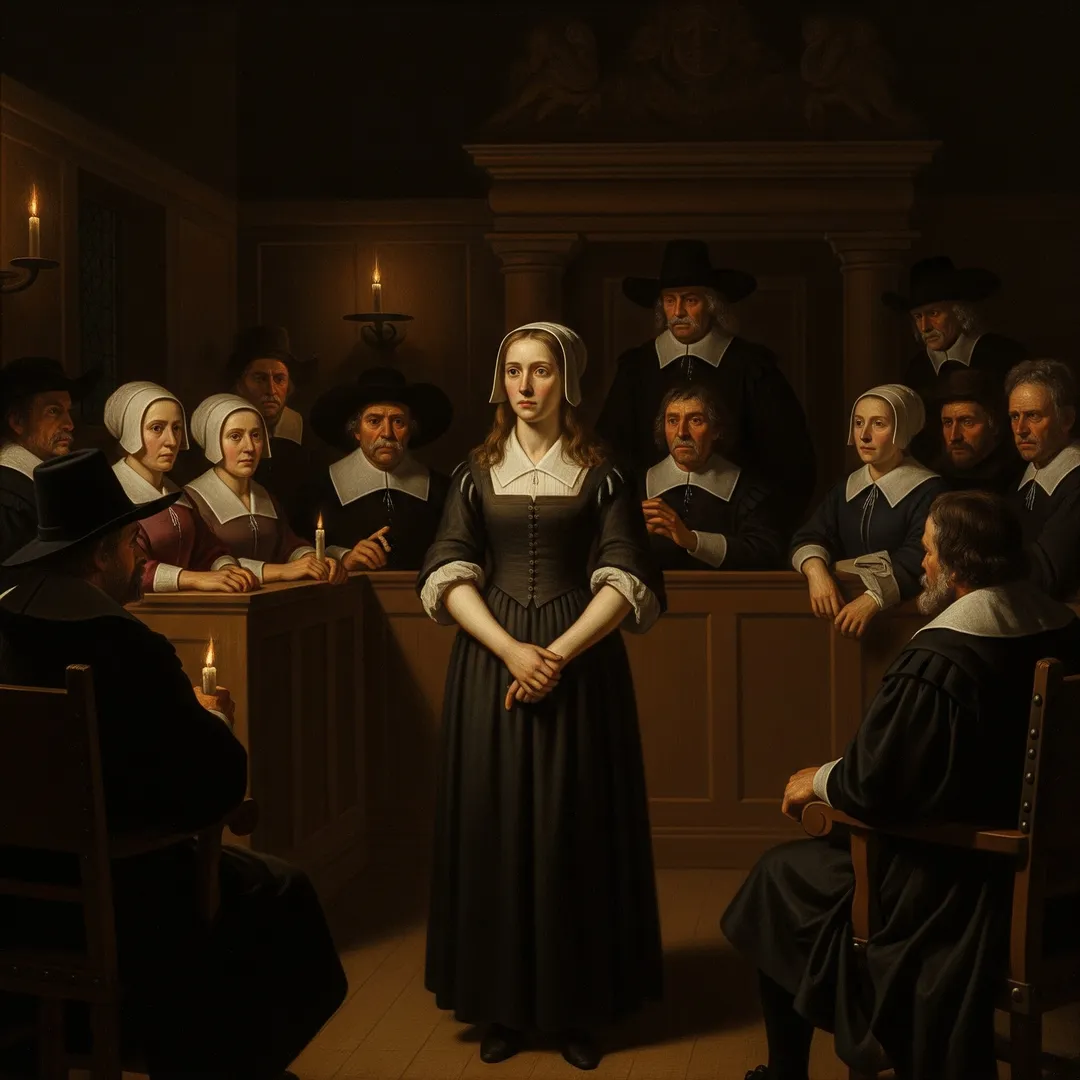Warning: Over 200 People Accused and 20 Executed—The Critical Missteps of the Salem Witch Trials
In 1692, the small village of Salem, Massachusetts, witnessed one of the most infamous and deadly witch-hunts in history. Over 200 people were accused, and 20 were executed in a frenzy of fear and paranoia that lasted just a few months. This tragic event serves as a cautionary tale, urgently reminding us of the dangers of mass hysteria, unchecked power, and the critical need for due process. As George Santayana famously stated, “Those who cannot learn from history are doomed to repeat it.”
The Problem: When Fear Trumps Justice
The Salem Witch Trials were characterized by a potent combination of fear, superstition, and intense societal pressures. An urgent examination reveals a community gripped by panic, where mere accusations were enough to destroy lives. The trials set a chilling precedent for how easily justice can be perverted when fear overtakes rationality. This historical episode highlights the fragility of legal systems when confronted with collective delusion. Why did this happen, and how can we prevent similar injustices in the future?
Why It Matters: Lessons for the Modern World
The Salem Witch Trials are not just a dark chapter in history but a critical warning of the consequences of unchecked hysteria and flawed justice systems. In today’s world, where misinformation and disinformation spread rapidly, understanding these events is crucial. As noted by the World Economic Forum’s Global Risks Report 2024, misinformation and disinformation are identified as severe threats, highlighting the potential for domestic propaganda and censorship, and making it increasingly difficult for citizens to discern truth from falsehood.
We must learn from the past to prevent history from repeating itself, especially in an era where technology can amplify fear and paranoia with alarming speed. The proliferation of AI-generated content and deepfakes, for instance, makes it easier for malicious actors to automate and expand disinformation campaigns, increasing their reach and impact. This underscores the timeless relevance of the Salem tragedy: the human susceptibility to fear and the critical importance of a robust, evidence-based approach to societal challenges.
Solutions to Prevent Future ‘Witch-Hunts’
To safeguard against future outbreaks of collective delusion and injustice, a multi-faceted approach focusing on legal, educational, social, and technological reforms is essential.
1. Strengthen Legal Safeguards and Due Process
One of the critical failures during the Salem Witch Trials was the profound lack of legal safeguards. Accusations were accepted without credible evidence, and trials were conducted without proper due process. To prevent future miscarriages of justice, it is urgent to strengthen legal systems worldwide.
This includes:
- Ensuring the right to a fair trial: This is a cornerstone of international law, with Article 25 of the International Covenant on Civil and Political Rights (ICCPR) guaranteeing the right to take part in public affairs and to equal suffrage, with other elements like separation of powers and an independent judiciary also protected.
- Presumption of innocence: A fundamental principle that requires individuals to be considered innocent until proven guilty beyond a reasonable doubt.
- Requirement of credible evidence: Moving away from “spectral evidence” or coerced confessions towards verifiable, objective proof. Organizations like the Innocence Project advocate for reforms such as mandatory recording of police interrogations to prevent false confessions, improving eyewitness identification procedures, and ensuring access to post-conviction DNA testing. In 2021, the Innocence Project successfully enacted 20 state-based reforms across the U.S., including laws requiring police to record interrogations in Ohio and Washington.
- Independent Judiciary: Ensuring courts and law enforcement are free from political influence, upholding the principle that legal rules are applied equally and impartially to all.
2. Foster Critical Thinking and Education
Education plays a pivotal role in combating ignorance and superstition. By fostering critical thinking from an early age, societies can better resist the allure of fear-driven narratives.
- Media Literacy Programs: Schools and communities must emphasize the importance of questioning information sources and understanding scientific processes. Research indicates the efficacy of media literacy skills in helping internet users process information critically and make informed decisions, especially in distinguishing genuine news from fake content.
- Curriculum Integration: Incorporating critical thinking skills into educational curricula has been shown to have a positive effect on academic achievement and critical thinking skills. Studies suggest that providing teachers with training on critical thinking methods can significantly increase students’ critical thinking abilities.
- Promoting Intellectual Humility: As historian Yuval Noah Harari suggests, “Questions you cannot answer are usually far better for you than answers you cannot question.” Encouraging an environment where admitting ignorance and seeking diverse viewpoints is valued can counter the rigid dogmatism that fueled historical witch-hunts.
3. Promote Open Dialogue and Community Resilience
During the Salem Witch Trials, fear silenced open dialogue and sowed distrust among community members. Encouraging open communication and building strong community networks can combat the isolation and fear that breed hysteria.
- Community Forums: Creating platforms for open discussion and promoting empathy and understanding can fortify communities against divisive and destructive narratives.
- Social Cohesion Initiatives: Investing in programs that build social capital and trust among diverse groups can prevent the “us vs. them” mentality that often precedes collective irrationality.
- Mental Health Support: Addressing underlying societal anxieties and providing accessible mental health resources can reduce susceptibility to panic and scapegoating. According to the World Health Organization (WHO), one in eight people worldwide lives with a mental disorder as of 2024, with anxiety and depression being the most common. The Ipsos World Mental Health Day Report 2024 highlights that 62% of people globally have felt stressed to the point where it impacted their daily life, and younger generations are particularly struggling. Prioritizing mental well-being is a critical component of public health.
4. Harness Technology Responsibly
Technology can be a double-edged sword, capable of spreading both information and misinformation at an unprecedented rate. It is critical to develop and implement technology responsibly.
- Platform Accountability: Ensuring that digital platforms prioritize accurate information and provide tools to identify and flag false content. The World Economic Forum’s Global Risks Report 2024 identifies AI-powered misinformation as the biggest short-term risk the world faces.
- Fact-Checking and Content Moderation: Collaborating with tech companies to develop and scale fact-checking initiatives and robust content moderation policies. Studies show that early detection and filtering of misinformation, as seen during the COVID-19 pandemic, significantly reduced exposure to false information.
- Digital Literacy: Encouraging digital literacy is also essential to empower individuals to discern credible sources from misleading ones. In 2023, 59% of Canadians reported being very or extremely concerned about online misinformation, and the OECD’s 2024 Truth Quest Survey found that respondents, on average, misidentified true and false content 40% of the time.
5. Address Root Causes of Fear and Anxiety
Fear and anxiety often stem from uncertainty and lack of control. Addressing these root causes by providing stable social frameworks, economic security, and robust mental health support can reduce the susceptibility to panic and scapegoating.
- Economic Stability: Policies that reduce economic inequality and provide social safety nets can alleviate anxieties that make communities vulnerable to fear-mongering.
- Public Health Infrastructure: Strengthening public health systems, including mental health services, is crucial. As of May 2024, a significant portion of the global population (up to 70%) does not receive treatment for mental illness, with stigma being a major barrier.
- Trust in Institutions: Rebuilding public trust in government, scientific bodies, and media can create a more resilient society less prone to believing unsubstantiated claims.
Action Plan: Your Role in Prevention
To act on these solutions, it is imperative to take the following steps:
- Legal Reforms: Advocate for policy changes that enhance legal protections and promote fair trial practices. Support organizations like the Innocence Project that work to correct wrongful convictions and reform the criminal justice system.
- Educational Initiatives: Support programs that focus on critical thinking and digital literacy in schools and communities. Encourage discussions that challenge assumptions and promote evidence-based reasoning.
- Community Engagement: Organize and participate in community discussions and workshops to build trust and resilience. Foster environments where diverse viewpoints can be expressed and debated respectfully.
- Technology Partnerships: Collaborate with tech companies and policymakers to develop tools that flag misinformation and promote transparency in online content.
- Mental Health Support: Encourage governments and local organizations to integrate mental health resources into public health policies, making support accessible and destigmatized.
Next Steps: A Collective Responsibility
The lessons of the Salem Witch Trials are too critical to ignore. By implementing these solutions, we can create a society that values reason over fear, and justice over hysteria. Engage with your local community leaders, advocate for educational reforms, and use your platform to promote rational discourse. Remember, the power to prevent the next ‘witch-hunt’ starts with each of us. Act now before it’s too late.
Frequently Asked Questions (FAQ)
Q1: What were the main causes of the Salem Witch Trials? A1: The Salem Witch Trials were caused by a complex interplay of factors, including extreme religious beliefs, societal tensions, economic anxieties, fear of the unknown, and a lack of robust legal procedures. The accusers’ testimonies, often involving “spectral evidence,” were accepted without sufficient verifiable proof.
Q2: How does the Salem Witch Trials relate to modern issues of misinformation? A2: The Salem Witch Trials serve as a historical parallel to how easily mass hysteria and misinformation can spread and lead to severe consequences. Just as rumors and unsubstantiated accusations fueled the trials, today’s digital age sees rapid dissemination of false information, amplified by social media and AI, leading to real-world harm, erosion of trust, and societal division.
Q3: What is “due process” and why was it lacking in the trials? A3: Due process refers to the legal requirement that the state must respect all legal rights that are owed to a person. In the Salem Witch Trials, due process was severely lacking because accusations were often accepted without concrete evidence, defendants were denied legal counsel, and the trials relied on coerced confessions and “spectral evidence” (testimony about seeing the accused’s spirit), which was inherently unprovable and biased.
Q4: What role does critical thinking play in preventing similar events? A4: Critical thinking is essential as it equips individuals with the ability to analyze information, question assumptions, identify biases, and evaluate evidence before forming conclusions. Fostering critical thinking skills helps individuals resist fear-driven narratives and makes communities more resilient to manipulation and mass hysteria, as demonstrated by research on media literacy programs.
Q5: How can technology be used responsibly to combat misinformation? A5: Technology can be harnessed responsibly through robust fact-checking mechanisms, AI-powered content moderation, and the development of tools to identify deepfakes and false content. Promoting digital literacy is also crucial to empower users to critically evaluate online information and identify credible sources.
Q6: Are there modern examples of “witch-hunt” like phenomena? A6: While not involving literal witch accusations, modern “witch-hunt” like phenomena can be seen in instances of cancel culture, online mob mentality, or the rapid spread of conspiracy theories where individuals or groups are targeted based on unverified information, leading to severe social or professional consequences without proper investigation or due process.
Q7: What is the Innocence Project’s role in legal reform? A7: The Innocence Project is a non-profit legal organization dedicated to exonerating wrongly convicted individuals through DNA testing and reforming the criminal justice system to prevent future injustice. They advocate for policy changes like mandatory recording of interrogations, improved eyewitness identification procedures, and greater transparency in forensic science.
Tags: #WitchTrials #LegalReform #CriticalThinking #CommunityResilience #DigitalLiteracy #MentalHealth #Misinformation #DueProcess #HistoryLessons #SEOEnrichment







